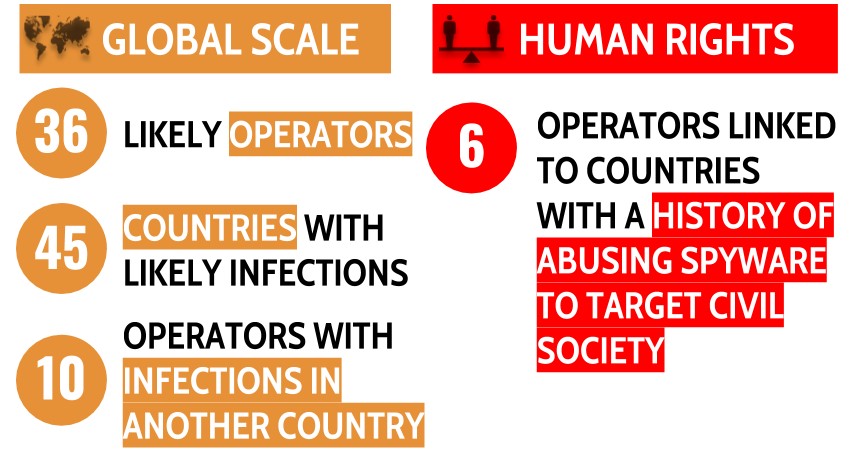The Tel Aviv District Court ruled in favor on Monday, July 13, of Israel’s Ministry of Defense (MOD) and the commercial spyware company NSO Group in a lawsuit submitted by Amnesty International which demanded that the MOD revoke the export license of the cyber security powerhouse.
In response to the court’s decision, Danna Ingleton, acting Co-Director of Amnesty Tech, said “Monday’s disgraceful ruling is a cruel blow to people put at risk around the world by NSO Group selling its products to notorious human rights abusers. At a moment when NSO and the Israeli MOD should be held accountable for their practices, it is appalling that the court has failed to do so. NSO Group continues to profit from human rights abuses with impunity. The ruling of the court flies in the face of the mountains of evidence of NSO Group’s spyware being used to target human rights defenders from Saudi Arabia to Mexico, including the basis of this case – the targeting of one of our own Amnesty employees. We will continue to do all we can to stop NSO Group’s spyware being used to commit human rights abuses.”
Amnesty petitioned the court to cancel NSO’s export license, claiming that the company violates human rights, including that its technology has been used by its clients to hack the cell phones of a number of Amnesty activists and employees. The NSO Group is notorious worldwide for developing Pegasus software, which some governments and intelligence agencies use to hack the cellphones of terrorists, drug rings and pedophiles.
The Ministry of Defense came to NSO’s defense early on in the trial and convinced the court to close all but the early minutes of the first hearing of the lawsuit to the public due to “national security considerations.” Even Amnesty’s lawyers did not get to hear most of NSO’s and the MOD’s arguments.
The court said the Ministry Defense of process for vetting NSO was significant and appropriate and took into account a range of business, diplomatic and technology considerations. Furthermore, the court said the ministry maintained heavy oversight even after issuing the license, which would be sufficient for it to know if it needed to revoke the export license due to any harm to human rights. Despite these conclusions, the court did not share any of the factual bases for its findings as is standard in court rulings.
This leaves Amnesty in a difficult spot because it does not necessarily know why the court ruled against it or how the court came to reject some of the serious evidence Amnesty assembled that NSO’s clients allegedly hacked some of its employees’ cellphones.
Amnesty International Israel director Molly Malekar said: “As a citizen of Israel and as a petitioner, the verdict reveals the court’s impotence to demand accountability and transparency by the Ministry of Defense, something required in every law-abiding state. Time and again, the court has accepted, the ministry’s version, without allowing it to be seriously examined, ignoring all the claims, evidence and testimonies that constitute a substantial base of evidence.”
Amnesty’s statement continued: “At no point did the state claim that it opened an investigation into the body of the allegations, even though the NSO Group admitted it had a list of clients at the specific time.” Further, the human-rights group said, “The Ministry of Defense merely claimed – but did not prove – that it was ‘rigorously, closely, and sensitively monitoring security export licenses,’ and according to the judge – ‘especially when it comes to human-rights violations.'” The statement went on to say, “This is a puzzling argument that ignores the allegations and evidence to the contrary around the world, both for NSO and in the context of Israeli security exports as a whole.”
Moreover, Amnesty stated, “When the Ministry of Defense gives this company a formal seal, it makes all the citizens of Israel complicit in the persecution of individuals from Saudi Arabia to Mexico, from Morocco to India; human-rights activists who are bravely opposed to oppression of individual freedoms and human rights.” Amnesty International concluded its protest to the court decision by urging “the public to support the initiative to change the Israeli Security Export Control Law” so that it becomes more similar to stricter oversight in Europe and the US.
Last January, Tel Aviv District Court Judge Rachel Barkai had allowed Amnesty lawyer Itai Mack to make arguments before a huge media presence about the importance of keeping part of the case open to the public.
At first, Barkai suggested allowing all of Mack’s arguments to be open to the media and only closing the hearing for the Ministry of Defense’s arguments in favor of maintaining the NSO’s license. However, after state lawyer Sara Bilu said this would make it look like the government was accrediting Amnesty’s accusations of human rights violations against the MOD and against NSO, Barkai abruptly reversed herself.
Pegasus, has been linked to political surveillance in Mexico, the United Arab Emirates and Saudi Arabia, according to the University of Toronto’s Citizen Lab, which researches digital surveillance, security, privacy and accountability. In October, WhatsApp, which is owned by Facebook, sued NSO in US Federal Court in San Francisco, accusing it of helping government spies break into the phones of about 1,400 users across four continents. Targets of the alleged hacking spree included diplomats, political dissidents, journalists and senior government officials.
Related:



